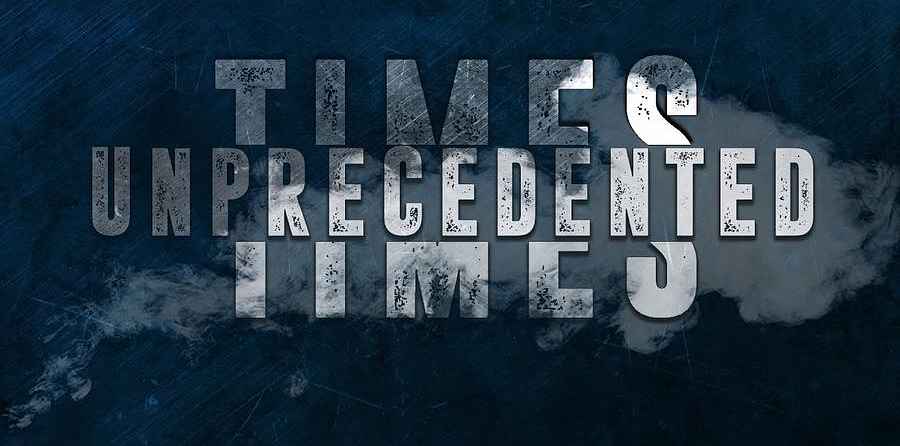






See listing of Recent and Most Popular articles on the Home Page
My World
Category: News & Current Events / Topics: COVID-19 • Crime, Justice, Punishment • History • Knowledge • Politics • Racism and Inequality • Social Issues • Voting & Elections
Unprecedented, Not!
by Stu Johnson
Posted: January 3, 2021
2020 was quite a year, but not without precedent . . . setting expectations for 2021…
My candidate for the most over-used word in 2020 is "unprecedented." Yes, for most of us—even those who have experienced many decades of life—2020 was unlike any other year in our lifetimes. It will be remembered for the COVID-19 pandemic; protests and riots over racism and economic inequality; and a very contentious and in many ways unusual election year. Unusual, yes. Historic, perhaps. Unprecedented, no.
Before giving some examples, let me suggest that what we need moving forward in 2021—both as individuals and a society—is a sense of perspective, a curiosity about history, judgment in our sources and use of information, empathy, and a good dose of common sense..
While I know it runs contrary to human nature, it would lower the national blood pressure to look for the good and best that does exist all around us, instead of focusing so much on the dark side. I am not suggesting a head-in-the-sand denial of the things that harm us and make life miserable for many, just asking that we make more room to recognize the good. In fact, some of the examples of good that have inspired me involve people of disparate viewpoints and backgrounds coming together to solve problems.
Back to the notion that we live in unprecedented times.
Consider this:
A groundswell of white nationalism. Impeachment headlines. A president caught in a bitter public feud with his own Congress. A resurgence of populism. A game-changing new form of media. A chief executive aiming fake news accusations at the national press. War and terrorism in the Middle East. A booming economy, with historically low unemployment. The FBI on the trail of a major presidential candidate regarding possible Russian conspiracy.
Sounds familiar, doesn't it? Very much like the year we just came through. But as author A. J. Baime reminds us in the introduction to his book Dewey Defeats Truman, "The year was 1948."
Baime details that incredible presidential election year, made famous by Harry Truman holding a copy of the Chicago Tribune with the headline "Dewey Defeats Truman." The Democrats had chosen Harry Truman as Vice President for Franklin Roosevelt's fourth term as president (now, that was unprecedented in the truest sense of the word!). Everyone thought Truman, who ascended to the presidency on the death of Roosevelt just as that term began in 1944, was absolutely a lost cause.
Baime's introduction catalogs the plethora of factors working against him. Everyone was sure he would lose, everyone that is, except Harry S. Truman. He proved everyone wrong by handing presumptive winner Thomas Dewey a humiliating defeat. Humiliating not only for Dewey, but to all the pundits, political advisers, and pollsters who got it wrong—not unlike 2016 and to some extent the underestimated strength of Donald Trump in 2020.
Following are a few examples to prove the point that what we consider unprecedented today actually has a long history. In his paraphrase of Ecclesiastes 1:11 from the Bible, Ken Taylor put it this way (emphasis mine):
. . . everything is unutterably weary and tiresome. No matter how much we see, we are never satisfied; no matter how much we hear, we are not content. History merely repeats itself. Nothing is truly new; it has all been done or said before. What can you point to that is new? How do you know it didn’t exist long ages ago? We don’t remember what happened in those former times, and in the future generations no one will remember what we have done back here.
(See how other English versions of the Bible translate it at BibleGateway.com)
Racism, Inequality and the Vote
White Supremacy, or White Nationalism, has been much in the news, not just in the United States since the 2016 election of Donald Trump, but in news stories suggesting such extremist groups are rising around the world. That is true, but it is not unprecedented. The whole debate over slavery in the United States and prejudice against "foreigners" (anyone outside the White Anglo-Saxon Protestant ruling class) is an integral part of the birth and development of America as a nation.
The failure to abolish slavery at the founding of the United States led to a series of compromises over the course of more than two centuries. To fashion a Constitution that would unite all of the thirteen colonies into the new nation required a number of compromises. One was the bicameral legislative branch to address states of different sizes, where each state would have two senators, but members of the House of Representatives would be apportioned according to population. Apportionment is the critical term. It echoes down right through the 2020 Census.
Slavery was allowed to continue, with slaves considered property, but worth three-fifths of a person when establishing the apportionment of members of the House. In the South, the black slave population represented a good proportion, if not the majority, of the population. Without getting some credit for them, the northern non-slave states would have a decided majority in the House of Representatives. Apportionment was and remains today a tool of political power. It is tied to population, not to those who have the right to vote, which was very restricted in early days and gradually increased to include all citizens today (and some think that is too restrictive!).
The issue of slavery was so contentious that it could be said a civil war was inevitable, though an alternative history has been built around the issue of states' rights. Following the failed secession of the Confederacy, the"Civil War Amendments" (13, 14, 15) officially abolished slavery and granted citizenship and a full vote to freed male slaves—not just to be counted as whole individuals for apportionment, but to have the right to vote. (The 19th Amendment, giving the vote to women citizens, would not come for another five decades).
With freed slaves outnumbering whites in most southern states, a new Republican voting block (out of loyalty to the Great Emancipator Abraham Lincoln) threatened Democratic majorities in the House for these states. In the first years of Reconstruction following the Civil War, blacks became land owners, operated businesses and were elected to state and federal office. (See the January-February 2021 issue of Smithsonian Magazine for an excellent article on the subject, "First in the House" by Bobby J. Donaldson. Unfortunately, it is not available online at this time.)
The assassination of President Abraham Lincoln increased political pressure to throw out Reconstruction and maintain Democratic control throughout the South. Lincoln's successor, Vice President Andrew Johnson was favorable to southern white supremacist sentiments. Then came Ulysses S. Grant, war hero turned reluctant politician.
In his book Grant, Ron Chernow suggests that Ulysses S. Grant was commuted to the ideals of Reconstruction as a way of shepherding the integration of newly freed slaves into life as citizens, but enormous political pressures, racial prejudice in the north and south, and corruption within his own administration produced an unrelenting tide of opposition.(Despite the corruption, Chernow defends Grant's personal integrity).
That opposition came to a head in the election of 1876. Baime describes the situation and relates it to the white supremacist candidacy of Strom Thurmond in 1948 (Truman supported integration, which drove southern Democrats to rebel and form the States' Rights Democratic Party, commonly called the Dixiecrats, with Thurman running for president):
Key to the traditions of white supremacy was the suppression of the black vote, and the black vote at the time was overwhelmingly for the Republican Party (the party of Lincoln). The paramilitary wing of the Democratic Party in South Carolina created a "Plan of the Campaign" to prevent blacks from exercising their right to vote. "Every Democrat must feel honor bound to control the vote of at least one negro," the plan read in part, "by intimidation, purchase, keeping him away or as each individual may determine how he may best accomplish it."
The year the Red Shirt movement crystallized, the nation saw one of its most controversial presidential elections, and one that would have a profound effect on the racial and political identity of both the South and the Thurmond family. The election was so close it became a matter of bitter dispute. The Republican Rutherford B. Hayes of Ohio trailed the Democrat Samuel J. Tilden of New York by nineteen electoral votes, but the results in Florida, Louisiana, and South Carolina were unclear. Both sides claimed victory, leader to a crisis in leadership. Congress created an electoral commission to solve the problem, made up of members of the Senate, the House and the Supreme Court. Ultimately, a deal was struck: All of the disputed electoral votes from these three southern states were given to the Republican Hayes, who won the presidency 185-184, and in exchange, Hayes agrees to withdraw the federal troops occupying the South, thus ending the period of Reconstruction.
The so-called Compromise of 1877 had two major consequences: (1) White supremacy returned to the South, and (2) politically, the Democratic Party controlled the South. The South became a single-party system—the so-called Solid South, right up until 1948 and the Dixiecrat revolt. White politicians created laws that made it difficult or impossible for black Americans to vote in many southern states, and the federal government left lawmaking to the lawmakers in these states.
Meanwhile, riding on the coattails of the Compromise of 1877, "Pitchfork" Benjamin Tillman cemented his political power, ultimately becoming governor of South Carolina. His personal lawyer was Strom Thurmon's father, John Thurmond.
Truman won that election in 1948, pushing civil rights into the public arena, but it would be another two decades before the Civil Rights of 1964 would pass under Democratic President Lyndon Johnson, despite efforts of Southern Democrats to block passage. Sen, Robert Byrd of West Virginia filibustered the bill for 14 hours straight. According to a summary of the time-line by Time magazine, "The House-approved bill arrived in the Senate on Feb. 26, 1964. It was passed 114 days later on June 19, after occupying the Senate for 60 work days (including seven Saturdays)." That was still the longest Senate debate at the time of the writing on the 50th anniversary of passage in 2014. Helping steer the bill to approval was one of its key authors, Senator Everett Dirksen (R-IL).
The odd thing about American politics is the way the two dominate parties exchange ideology over time. The "Solid South" controlled by Democrats before the Civil Rights Act of 1964 morphed into the solid red states controlled by Republicans in more recent time. The driving force, however, has as much or more to do with winning elections than with a grand commitment to philosophical principles and ideological ideals.
The common currency is votes. The objective is gaining and maintaining political power. A major tool, honed by Franklin Roosevelt during the Depression, was the identification of and appeal to voting blocks (see Amity Shlaes' book "The Forgotten Man: A New History of the Great Depression").
My reading related to mid-19th century America causes great sorrow that the more noble aspects of Reconstruction could not be carried trough.
It turns the geest struggle of the Civil War into a Lost Cause. The Union was preserved, but at what a terrible cost!
As with all human endeavors, there can be unintended consequences even from the finest efforts we make. But to sabotage Reconstruction as a movement that could have brought closer to reality the ideals of our founding documents ("all men are created equal. . . " from the Declaration of Independence) is grievous.
Today there are those who believe the founding documents are just another set of untruths, a propaganda tool to make a political point at the time of their writing, but I choose to believe that they contain ideals that stand the test of time and still burn in the hearts of all people, especially the most down-trodden. The injustice is not that things were falsely claimed in the Declaration and other documents, but that they have taken so long to be achieved and then, only in part. Yet, they continue to serve as a beacon to guide the way and provide hope. That is the precedent that should define America.
For more on these subjects, see the lists of articles that have been posted to SeniorLifestyle on Racism and Inequality and Voting & Elections.
The COVID-19 Pandemic
Okay, that was a pretty long dive into what I regard as an important point about precedent and the need to understand history. Let me conclude with two points related specifically to the pandemic.
PERSPECTIVE
The COVID-19 pandemic is ours to deal with, perhaps made unique by the levels of instant global communication, mobility and government involvement, but it is not the first, nor the last, of such events to hit our planet. In centuries past, plagues were more slow moving, but far more devastating, wiping out entire villages in some cases. Up until a few generations ago, child mortality was high and all too common. In the grand sweep of things, it is only within the last century or so that common life-threatening diseases have been eradicated. Even in the childhood of many SeniorLifestyle readers, the scourge of polio was a recurring threat.
As I have pointed out in a series of articles about the current pandemic, the Spanish Flu of 1918-19 was far more devastating.
The 1918-19 Spanish Flu pandemic is estimated to have struck 500 million, 26.3% of the world population of 1.9-billion at that time. Deaths have been widely estimated at between 50- and 100-million worldwide, putting the mortality rate somewhere between 10 and 20-percent worldwide. It has been estimated that 675,000 died in the U.S.
IF COVID-19 hit at the same rate as 1918, we would see about 2-billion cases worldwide today. with the global population now at 7.8-billion. There would be 200- to 400-million deaths. For the U.S., this would mean cases approaching 90-million and deaths of nearly 9-million and perhaps as high as 18-million.
As of December 31, there have been 63.5-million cases worldwide (0.8% of the population of 7.8-billion). There have been 1.4-million deaths, which translates to a mortality rate of 2.2%.
The U.S. has recorded 20.4-million cases (4% of the population, but 22% of all cases reported in the world) and 354-thousand deaths (a mortality rate of 1.7%, yet 19% of global deaths).
Those are certainly stark numbers, and we're far from over, but so far mitigation efforts may well keep the final toll far below 1918 (which was compounded in spread and additional causalities by World War I). What may be long remembered about the COVID pandemic of 2020-21 is the isolation, the weariness of coping with mitigation efforts and the resultant series of surges.
EMPATHY
The PBS News Hour did a piece recently honoring the roughly 350-thousand Americans who have died from the COVID-19 virus. It was pointed out that if you read one name every second, it would take four days to read all the names.
The stories are heart breaking. But every year, nearly 600-thousand people die in the U.S. from cancer. Many of those stories are just as heart-breaking: with promising lives cut short; devastated families; sometimes shockingly fast, other times stretching out for years. It would take seven days to read all those names at the rate of one per second—another eight days for heart disease, two each for Alzheimer's, stroke and accidents—and we would have to repeat those year after year.
Here's the point: COVID has focused our attention because it impacts entire countries. Other forms of death are part of the constant background of "normal" life. If it is too maudlin, too depressing, too constant to make ongoing national recognition of thse other causes of death in a similar way, we can cultivate empathy at the personal, local level, the "love your neighbor" mandate. COVID has at least given us a glimpse of how to express such empathy and put faces on the numbers.
See a list of all of my articles related to COVID-19
Related articles this week:
While the development of multiple vaccines for COVID-19 happened with "unprecedented" speed, we still face a long return to normal. And we start the end of the journey with, for many of us, the dark, dreary months of winter. To help provide some food for thought, you will find this week two articles that deal with the points I have tried to make here: "It's Not All Bad" by Nicole E Kobie of WIRED, looks at twenty things that helped make the world a better place in 2020, and "Dreading a Dark Winter Lockdown" by David Robson of The Guardian shows what we can learn from the Norwegians, who deal with the "polar night" every winter.
So, here's wishing that we can all learn from the past and move into 2021 with a confidence that we can help make the world a better place, even as we long for the end of the pandemic.
Search all articles by Stu Johnson
Stu Johnson is principal of Stuart Johnson & Associates, a communications consultancy in Wheaton, Illinois. He is publisher and editor of SeniorLifestyle, writes the InfoMatters blog on his own website and contributes articles for SeniorLifestyle. • Author bio (website*) • E-mail the author (moc.setaicossajs@uts*) • Author's website (personal or primary**)* For web-based email, you may need to copy and paste the address yourself.
** opens in a new tab or window. Close it to return here.
Posted: January 3, 2021 Accessed 622 times
![]() Go to the list of most recent My World Articles
Go to the list of most recent My World Articles
![]() Search My World (You can expand the search to the entire site)
Search My World (You can expand the search to the entire site)
![]() Go to the list of Most Recent and Most Popular Articles across the site (Home Page)
Go to the list of Most Recent and Most Popular Articles across the site (Home Page)
 Loading requested view...
Loading requested view...
